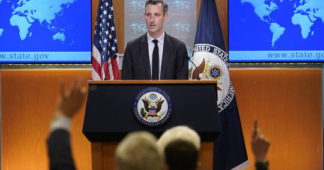by
Feb 3, 2022
In recent weeks, Turkey’s President Recep Tayyip Erdogan has claimed he was uniquely positioned to negotiate a reduction in tensions between Russia and Ukraine. Turkey is a NATO member state that purchased advanced Russian weapons, and has been at decisive odds with the Western foreign policy in Syria. Earlier this week, Turkey announced Erdogan would travel to Ukraine “to be the intermediary in this conflict.”
However, the Turkish president had other plans. The Wall Street Journal reports that Erdogan changed his peace trip into a weapons sale and inked an agreement that allows Ukraine to manufacture armed Turkish drones. Turkey has already sold Ukraine dozens of its armed Bayraktar TB2 drones, which Kiev soon deployed against separatist forces in the Donbas.
Along with the plans to build Turkish drones, Ukraine is adding to its domestic weapons manufacturing with a new missile program, pursuing multiple missile variants including a cruise missile that could be used to target Russian ships, and a second design that would put Moscow within its range.
The Ukraine-Turkey drone deal was signed as the Biden administration was making a new, evidence-free accusation against Russia. State Department Spokesperson Ned Price claimed Moscow was planning to make a graphic video – using crisis actors – of a ‘false flag’ attack on Russians to create an excuse to invade its neighbor.
While Associated Press reporter Matt Lee pushed Price to offer some evidence for the explosive claim, the spokesman insisted he had provided journalists with all the information they needed. When Lee again pressed for proof, Price snapped, suggesting Lee was promoting the Russian narrative.
“If you doubt the credibility of the US government, of the British government, of other governments and want to find solace in information that the Russians are putting out, that is for you to do,” Price said.
The accusations seem to be a new PR tactic from the Biden administration. When an NPR journalist questioned the Pentagon’s narrative about a recent raid on the leader of the Islamic State, White House Press Secretary Jen Psaki was indignant, asking whether the reporter was suggesting that “ISIS is providing accurate information?”
The journalists were right to question the administration in both cases, as initial claims from government officials have often proven false. Following drone strikes in Kabul on August 29 – some of the last acknowledged combat operations in the 20-year war in Afghanistan – Washington initially claimed the mission was a “righteous” success. It was later revealed that 10 civilians, and zero Islamic State terrorists, were killed in the blasts. More recently, after several senior US officials repeatedly predicted an “imminent” Russian invasion of Ukraine for some two months on end, the White House has now backed off from that claim.
We remind our readers that publication of articles on our site does not mean that we agree with what is written. Our policy is to publish anything which we consider of interest, so as to assist our readers in forming their opinions. Sometimes we even publish articles with which we totally disagree, since we believe it is important for our readers to be informed on as wide a spectrum of views as possible.











